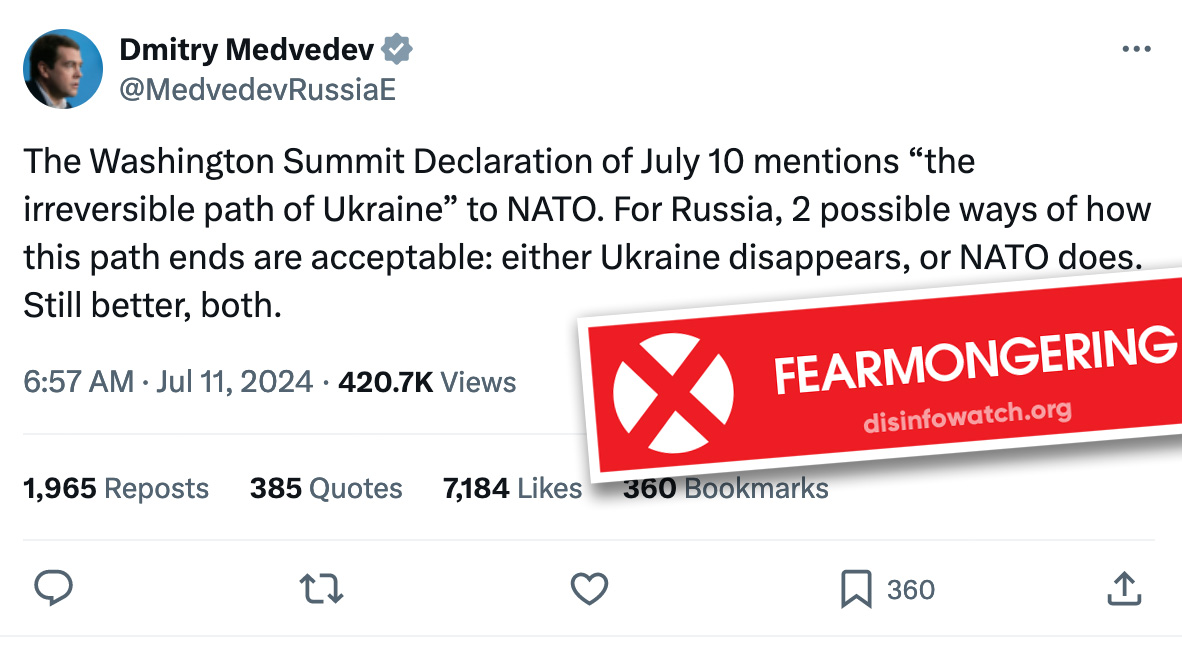
The Claim:
Former Russian President Dmitry Medvedev has threatened in a Twitter/X post that his country will make Ukraine “disappear.” Earlier, in a Telegram post, he wrote that Russia would not stop its war until Ukraine is recolonized.
The Facts:
Medvedev is regularly used by the Kremlin to issue aggressive threats against Ukraine and threats of nuclear war against the Western democratic world. While there is nothing inherently false in this, it is a form of irrational fearmongering.
Narrative Context:
Medvedev’s Twitter/X and Telegram posts are calculated pieces of propaganda designed to reinforce Russian narratives about the Ukraine conflict, maintain public support, and prepare the Russian people for a protracted struggle. They leverage historical references, fear, and calls for vigilance to sustain justifications for Russia’s actions and to undermine the morale of its opponents.
The rhetoric used in the post serves multiple strategic purposes within the framework of Russian propaganda. Here’s a breakdown of its components and their roles:
Narrative Reinforcement
- Perpetual Conflict:
Medvedev asserts that Russia’s military operation in Ukraine will not end even after a formal defeat and peace agreement. This perpetuates the idea of an ongoing existential threat, fostering a sense of continuous conflict. - Demonizing the Opposition:
By labeling Ukraine’s leadership and forces as “Nazis”, “radicals” and “reptiles,” Medvedev dehumanizes the enemy, making it easier to justify extreme measures and atrocities against them. This dehumanization is a common propaganda tool to rally domestic support and demoralize the opposition and incite hate towards Ukrainians.
Psychological Operations
- Fear and Paranoia:
The post fosters fear among Russian citizens about the continuous threat posed by Western countries. Medvedev suggests that even after a military victory, enemies will persist and regroup, thus justifying ongoing militarization and suppression of dissent. - Call for Vigilance and Sacrifice:
The rhetoric of being prepared for future battles to “defend the Fatherland” appeals to patriotism and encourages the public to accept hardships and sacrifices. This serves to maintain public support for the war and the government’s policies.
Strategic Messaging
- Internal Justification:
The message justifies prolonged military engagement and potential future conflicts, preparing the domestic audience for continued warfare. It sets the stage for future military actions and suppresses potential opposition by framing them as traitorous or naïve. - External Signaling:
For international audiences, particularly in Ukraine and the West, the post signals Russia’s unwavering commitment to its neo-imperialist objectives. It attempts to undermine morale in Ukraine by suggesting that resistance is futile and that any gains are temporary.
Contextual Analysis
- Addressing Russian Setbacks and Challenges:
This post comes at a time when Russia is facing significant challenges or setbacks in its military campaign. By emphasizing the inevitability of Russian victory and the necessity of continued struggle, Medvedev aims to reassure both the Russian public and military personnel. - Propaganda Consistency:
The themes in this post are consistent with broader Russian propaganda efforts that emphasize historical grievances, demonize opponents, and project an image of Russian resilience and moral superiority.
Partially translated text of Medvedev’s Telegram post:
“But this will not be the end of Russia’s military operation. Even after signing the papers and accepting defeat, the rest of the radicals, after a regrouping of forces, will sooner or later return to power, inspired by Russia’s Western enemies. And then the time will come to finally crush the reptile. Drive a long steel nail into the coffin of Bandera’s quasi-state. Destroy the remnants of his bloody legacy and return the remaining lands to the bosom of the Russian land.
But Russia’s enemies will not go anywhere after this. They will accumulate strength and wait for a new convenient reason to destroy our country. We must be prepared for future battles to defend the Fatherland.”

